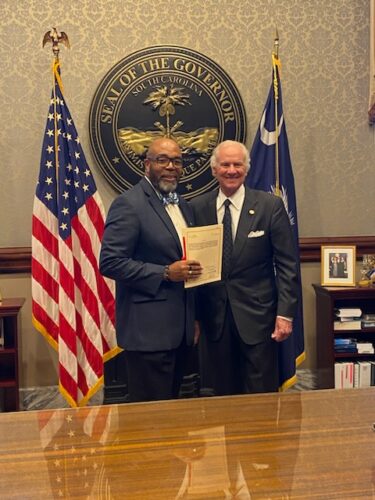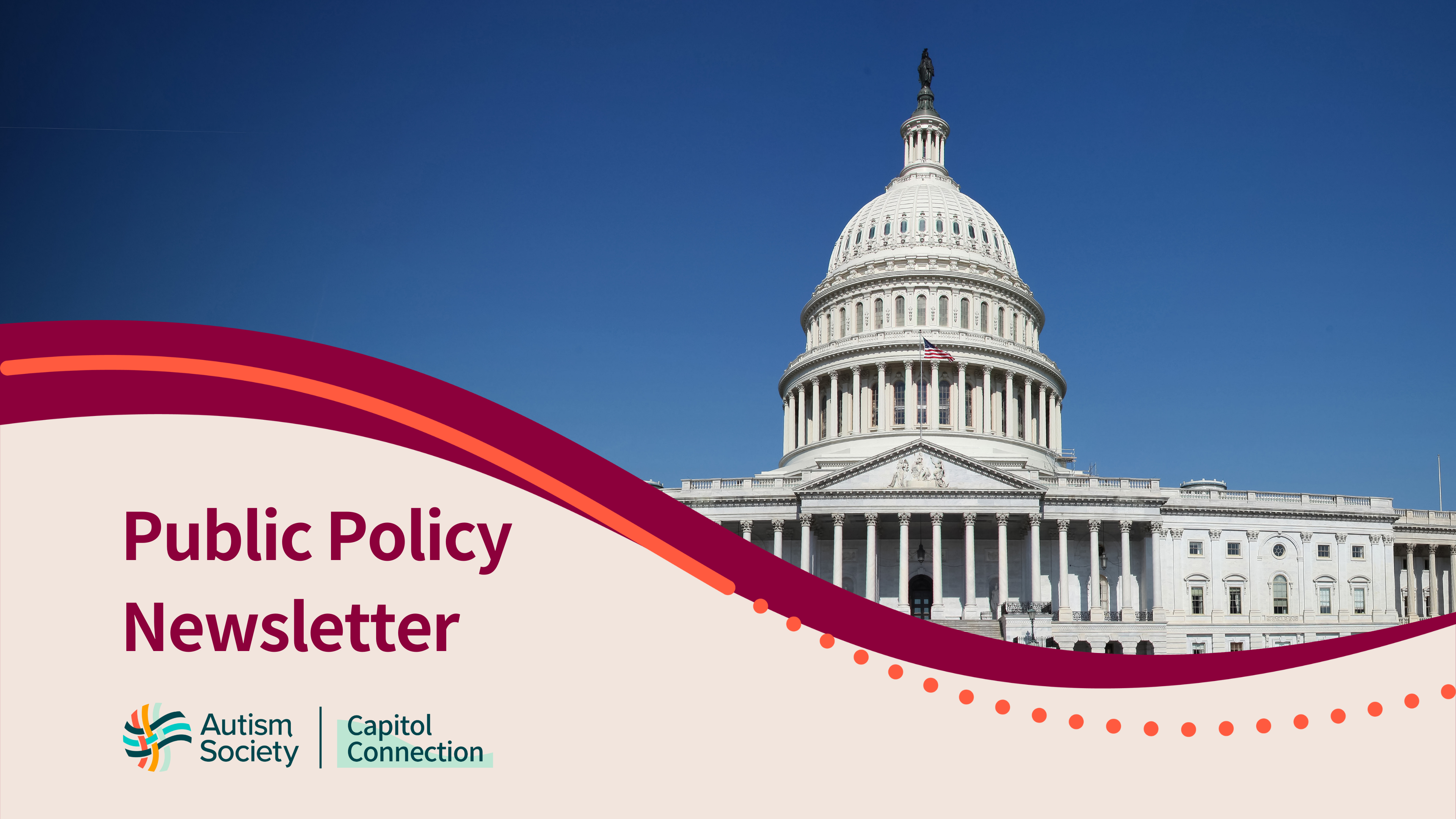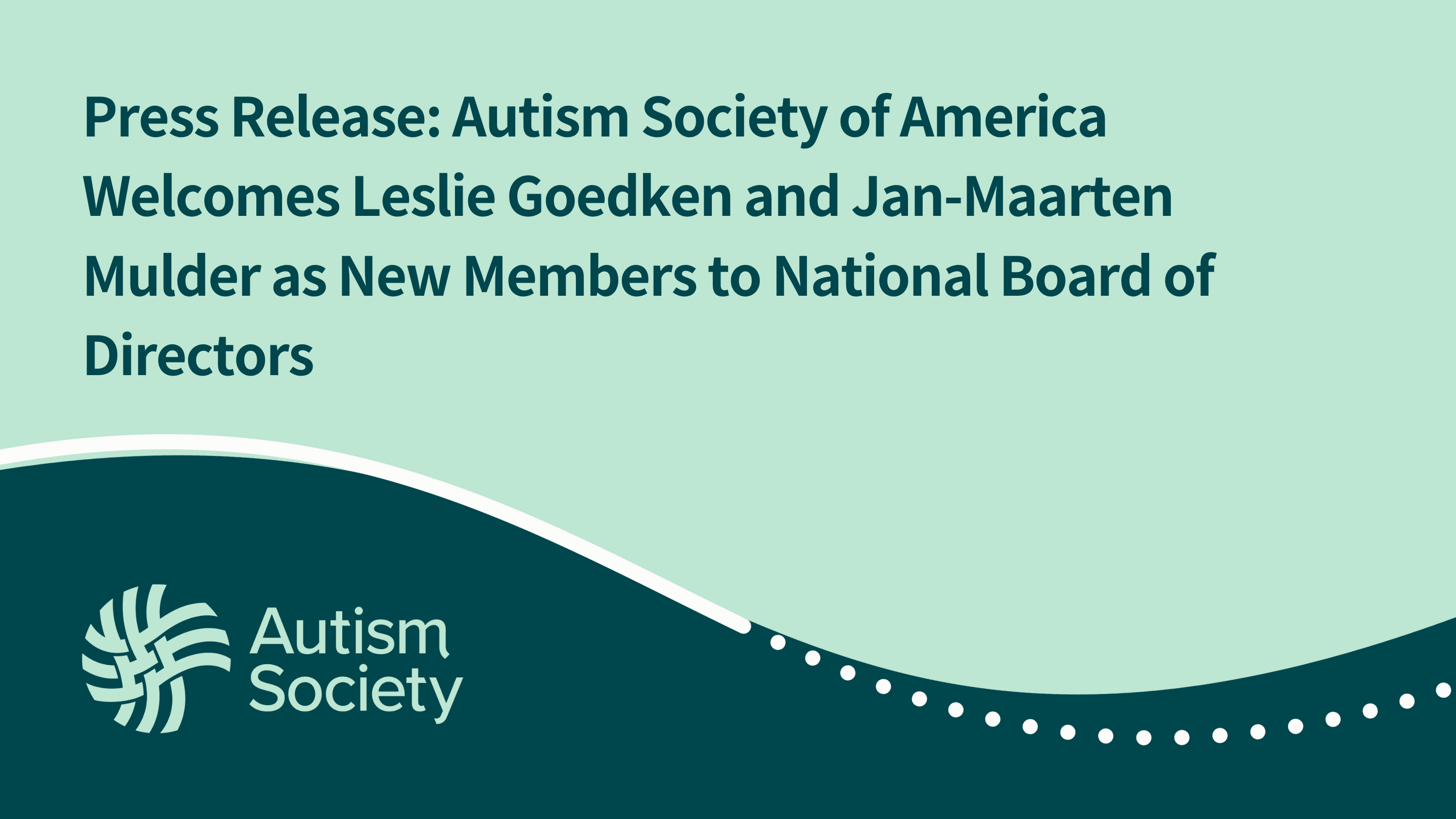
In this issue of Capitol Connection, see updates on the new House Speaker, budget and appropriations, several newly re-introduced bills, and resources that can be used in federal and state advocacy efforts. Please use the Autism Society’s Action Center to educate your Members of Congress to support funding for Autism related programs.
Budget and Appropriations
Last Wednesday, the House of Representatives elected a new Speaker, Mike Johnson (R-LA). Johnson, a former lawyer and talk-show host, called for unity in his first address. He called on the House to get back to work, laying out an aggressive appropriations schedule. House Republicans want to pass steep cuts to fiscal 2024 spending. Doing so will likely set up a clash with Senate Democrats. Senate Majority Leader Charles E. Schumer (D-NY) said last week that bills that make cuts way below what is established under the summer’s debt limit law will be “dead on arrival” in the Senate. This year’s spending bills are already overdue, with the fiscal year having begun on October 1. Federal agencies are operating under a continuing resolution at current levels that expires on November 17. This means another continuing resolution will likely be needed to allow more time to complete the funding bills.
HCBS Relief Act
Last week, Senator Casey (D-PA) and 19 other cosponsors introduced the HCBS Relief Act of 2023 (S. 3118). This bill would provide Medicaid funds to states for two years to stabilize their home and community-based service (HCBS) delivery networks, recruit and retain HCBS direct care workers, and meet the long-term service and support needs of people eligible for Medicaid home and community-based services. States would receive a 10-point increase in the federal match (FMAP) for Medicaid for two fiscal years to enhance HCBS, essentially extending the American Rescue Plan funding. Funds could be used to increase direct care worker pay, provide benefits such as paid family leave or sick leave, and pay for transportation expenses to and from the homes of those served. The additional funds also can be used to support family caregivers, pay for the recruitment and training of direct care workers, and pay for technology to facilitate services. The funds can help decrease or eliminate the waiting lists for HCBS in the states. Cosponsors include Senators Merkley, Duckworth (D-IL), Smith (D-MN), Blumenthal (D-CT), Reed (D-RI), Baldwin (D-WI), Gillibrand (D-NY), Sanders (I-VT), Warren (D-MA), Stabenow (D-MI), Whitehouse (D-RI), Booker (D-NJ), Welch (D-VT), Kaine (D-VA), Klobuchar (D-MN), Fetterman (D-PA), Van Hollen (D-MD), Markey (D-MA), and Heinrich (D-NM).
Disability Employment Incentive Act
Senator Casey (D-PA) re-introduced the Disability Employment Incentive Act (S. 3076) on October 18, 2023. This bill amends the Internal Revenue Code to include individuals receiving Social Security disability benefits under the work opportunity credit, increase the work opportunity credit for vocational rehabilitation referrals, qualified SSI recipients, and qualified SSDI recipients, expand the disabled access credit, and enhance the deduction for expenditures to remove architectural and transportation barriers to the handicapped and elderly. Senators Sherrod Brown (D-OH), Tammy Duckworth (D-IL), Chris Van Hollen (D-CT), and Kirsten Gillibrand (D-NY) co-sponsored the bill. There is currently no corresponding House bill. The Autism Society supports this legislation.
Emergency Planning Bill
Senator Casey (D-PA) introduced the Disaster Relief Medicaid Act (DRMA) on October 24 with 10 cosponsors including Senator Blumenthal (D-CT), Welch (D-VT), Van Hollen (D-MD), Gillibrand (D-NY), Warren (D-MA), Brown (D-OH), Sanders (I-VT), Fetterman (D-PA), Schatz (D-HI), and Duckworth (D-IL). This legislation would ensure that people with disabilities and seniors who rely on Medicaid waivers do not lose the life-sustaining support they rely upon after a federally declared disaster or emergency. For individuals forced to relocate to another state due to disaster or emergency, DRMA would protect those residing in an area covered under a presidential disaster declaration as a “Relief-Eligible Survivor” and grant them the support needed to easily access or apply for Medicaid services in their host state. Over 240 organizations support the legislation, including the Autism Society.
Hearing on LTSS
On October 25, the Health Subcommittee of the House Energy and Commerce Committee held a hearing entitled “Supporting Access to Long-Term Services and Supports: An Examination of the Impacts of Proposed Regulations on Workforce and Access to Care.” In this hearing, the committee examined two proposed rules including the HCBS Access Rule and the Minimum Staffing Rule. It was acknowledged by both parties that the long-term service system is in crisis in terms of staffing. However, Republicans questioned whether these proposed rules would solve the issue. Witnesses included a certified nurse aide, the Executive Director of the National Consumer Voice for Quality Long-Term Care, and the former chief of the Tennessee LTSS system.
New Kaiser Report on DSPs
The Kaiser Family Foundation (KFF) released a new issue brief on what states are doing to tackle the direct support professionals’ shortage for home and community-based services. KFF sent a survey to all states to inquire about steps they are taking to retain and attract DSPs and to learn more about their HCBS system. The survey unveiled that all states are implementing a strategy for their DSPs with the most prominent being to increase provider payment rates and the second most popular being training programs. In addition, 43 states have had to permanently close at least one HCBS provider, including adult day support programs and group homes. There are vast differences between wages that fee-for-service plans and managed care plans can provide, as well as a vast difference between wages depending on the type of worker. KFF stresses that as the increased HCBS funding from the American Rescue Plan runs out, there will be even more pressure on the HBCS systems in the states. This report will be helpful as we advocate for the HCBS Relief Act (see above).
Subminimum Wages Listening Sessions
The U.S. Department of Labor is hosting a series of stakeholder engagement sessions as it completes a comprehensive review of the Section 14(c) program within the Fair Labor Standards Act (FLSA). Section 14(c) of the FLSA, passed in 1938, allows public and private employers to obtain special certificates from the Department of Labor’s Wage & Hour Division that allow them to compensate workers with significant disabilities at rates below the current federal minimum wage based on the individual’s level of measured productivity. This results in a disproportionate number of individuals with intellectual and developmental disabilities being automatically placed into a subminimum wage position, usually in segregated facilities, after exiting the public school system. The Autism Society was invited to the first listening session at the Department of Labor on October 20. A public session was held virtually on October 26. Additional public comment sessions are on November 1 at 2-3:30 pm ET and November 15 at 5:30-7:00 pm ET. More information and to register, visit the Office of Disability Employment Policy’s website.
GAO Report on COVID-19 Funding for States
The Government Accounting Office (GAO) released a report outlining state use of COVID-19 relief funding. Six states reported spending 75 percent or more of their funding from the American Rescue Plan, while 15 states reported spending less than 25 percent. The majority of funding was used to replace revenue for government services, such as funding school programs, and to address the negative economic impacts of COVID-19, such as small business loans.
South Carolina Governor’s Signing

Shawn Keith from the Autism Society of South Carolina with Governor Henry McMaster
The Autism Society of South Carolina’s Executive Director, Shawn Keith, was invited to a signing ceremony with Governor Henry McMaster (R-SC). This law amends the state’s existing missing alert to include individuals with Autism and other developmental disabilities.
Share:




